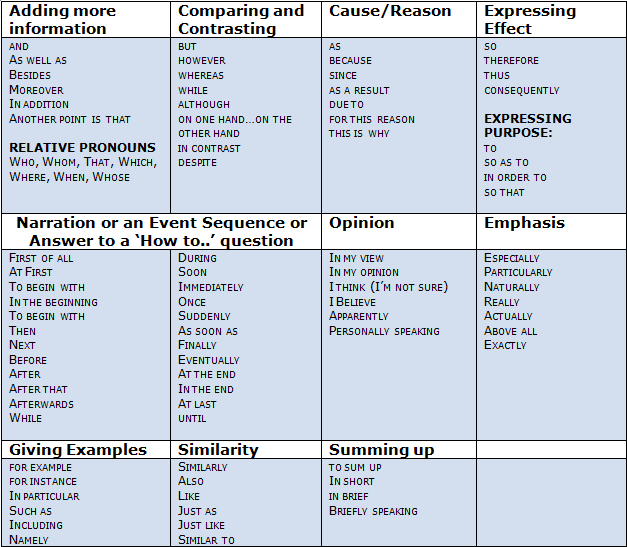
To impressively speak your sentences together, first of all, learn to use some ‘linking words’ such that you form a connected speech and therefore your listener enjoys it as a story. As experience with real-life conversations tells us, that the stories are comprehended easily and are listened with much interest and therefore are appreciated more than some ‘d-i-s-j-o-i-n-t’ sentences which are spoken merely to fill the allotted time. Eventually, it’s the usage of ‘Linking words’ as underlined that make an otherwise boring speech to flow like a story. In short, it makes better sense to tell a story since people enjoy it. After-all Stories sell!
In my opinion, they are as salt in a recipe so when composing a simple description –where you need to add more information, as well as while narrating an event; you need to use them just right. In brief, don’t use too little salt neither too much!
Could anyone understand the paragraph ABOVE without ‘linking words’ that I have underlined?
While reading, you would not have reached to the end of the story (where I talk about ‘salt in recipe’) AND if you somehow have due to some compulsion to read, you would not understood whatever I meant.
Read on if the above makes sense to Learn some commonly used linking words (an English professor my like to call them by various names – phrasal-verbs, conjunctions) I also give my views on how and where to use them (or not to) to be an impressive speaker or a story-teller.
Here are six fundamental types of speaking that you may normally do in an official environment or even when appearing for a critical interview:
- Describing your company or product – providing additional information.
- Narrating events or answering ‘How to’ questions – something that goes in a sequence.
- Doing Comparison or Contrasting – your company’s services as compared to the competition.
- Explaining Cause and Effect – giving explanation or reason for the delay, for instance. Caution: Don’t do it until asked for with a ‘why’ question
- Entering into an Arguments or Debate – everyone doesn’t need to be lawyer but argument do happen and you have ‘make your point’
- Summing-up or giving overall conclusion – giving information in brief for example what happened in the meeting.
Don’y even try to open your mouth to speak to someone ‘any of the above’ without the connectors or ‘Linking words’.
Personally speaking, I hate giving explanation as also noting down the minutes of meetings but it may just be part of the job and some the job-saver or the job itself…… In contrast, I love to give examples, adding more information so that students have it all (giving reason 😉 ). As a result, the understand more and listen to the story on ‘How to learn…’. In short, I want each lesson to go like an interesting story.
For your to weave your stories together, it is important to learn how and where to use the right linking words. As I said, they add the required flow to your speech when you speak even 4-5 or more sentences together. To keep the interest of the listener alive, Learn to use these words appropriately:

‘How to best learn them such that you immediately gain advantage:
Here are some tips from my experience and some that I picked in a T.r.i.c.k.s class for intermediate/advanced students:
Its better If you practice them with other learners in a supervised environment, at first, there are less chances of your being wrong afterwards, as you start speaking in public.
You get many examples right and wrong (and both help) from other learners… as also there is someone to point out the over-usage – a communication expert and not just an English professor. ( like me 😉 for instance. Am I taking too many liberties with the smilies?)
How boring it is to listen to someone’s daily routine with 5-6 usages of ‘then’ : “I start my day at…then… then…then…then”. I rather stop this speaker short on communication skills, though grammatically nothing out rightly wrong in it.
Some more DON’Ts I have noticed: Don’t over-use any of them, particularly ‘because’ before all the statements even when you are telling ‘what do you like’ where justification or explanation is not required. Never get into the habit of using some of them as ‘a filler’ word such as: Really or Actually.
Enjoy speaking naturally and I am sure your audience will equally well enjoy listening to your story!

